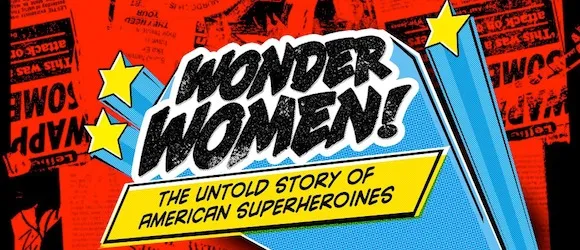To start off, full disclosure: I’m a female geek who loves film history, documentaries and, to a lesser extent, comic book culture. So I’m pretty much predisposed to like any documentary called Wonder Women! The Untold Story of American Superheroines. But I’m guessing that, if you’re reading this, O Mary Sue reader, you probably are too.
If that’s the case, you’ll be happy to hear that Wonder Women, directed by Kristy Guevara-Flanagan, doesn’t disappoint. The film, which has been making the rounds on the film festival circuit (I caught it at the Seattle International Film Festival earlier this month), brings in Gloria Steinem, Lynda Carter, Lindsey Wagner, Jane Espenson and many more actors, producers, feminist and media scholars and plain ol’ Wonder Woman superfans to discuss the birth and evolution of the female superhero, from the creation of Wonder Woman (by matriarchy-obsessed bondage enthusiast, psychologist, and inventor William Moulton Marston) to the current post-Buffy/Ripley/Sarah Connor world.
It’s a pretty big subject, and given the movie’s 60-odd minute running time it would be impossible to cover any specific aspect of it in-depth. Wonder Women doesn’t try to—it’s a good, fun overview that, personally, got me intrigued about some aspects of the history of superheroines I wasn’t familiar with (Wonder Woman in the ‘50s—What. The. Hell?!) while also causing me to bounce up and down excitedly when characters and shows I like (hey Buffy, The Vampire Slayer!) made an appearance.
Wonder Women isn’t just a history lesson committed to film, though. The various feminist and media scholars interviewed in the film place the evolution of the superheroine within the broader context of the feminist movement, examining its impact on the Women’s Movement of the ‘60s and ‘70s, the Riot Grrrl movement of the ‘90s and the younger female geeks currently coming of age. And it’s that last part that gives Wonder Women some of its most most inspiring moments. I wish I’d been as comfortable with my geekiness when I was as young as Wonder Woman fan Katie Pineda, who was inspired by her hero’s strength and capability to not let peers make her feel bad about doings things she enjoys, like shooting arrows, drawing comics and dressing up as Wonder Woman at conventions. And while it’s true that 97% of the decision-makers in the entertainment world are men, it’s hard to watch the participants at Seattle’s Reel Grrls summer video camp discover their love of making short films and not get the impression that there are going to be a lot more female content creators on the scene a few years from now.
Sure, there are a lot of aspects of the representation of female heroes that were glossed over. I, for one, didn’t mind that. Yes, there is still rampant sexism in comics, TV and movies. It’s obvious, and it’s not something that anyone with a modicum of sense would dispute. But that’s not what Wonder Women is about. It’s a film about empowerment, about taking a look at where we are now compared to where we were 70 years ago and realizing that yeah, there’s still a lot that needs to change—but, at the risk of sounding cheesy, with so many real-life superheroines living in the world, change is possible.
Wonder Women! The Untold Story of American Superheroines is still screening at festivals—if you happen to be in Australia on July 12th or 15th, you might be able to catch it at the Perth International Film Festival. There’s been no information on a DVD/VOD release yet—but when it does become available for home viewing, it’s definitely worth checking out. (It would also make a great double-bill with 2010’s With Great Power: The Stan Lee Story… if someone sets up a movie night with those two, be sure to invite me.) You can keep up with the film’s future screenings (and hopeful eventual DVD release) at its website or by following it on Facebook and Twitter.
Rebecca Pahle writes for MovieMaker.com.
You know who else you could follow? The Mary Sue on Twitter, Facebook, Tumblr, Pinterest, & Google +!








Published: Jun 21, 2012 12:29 pm